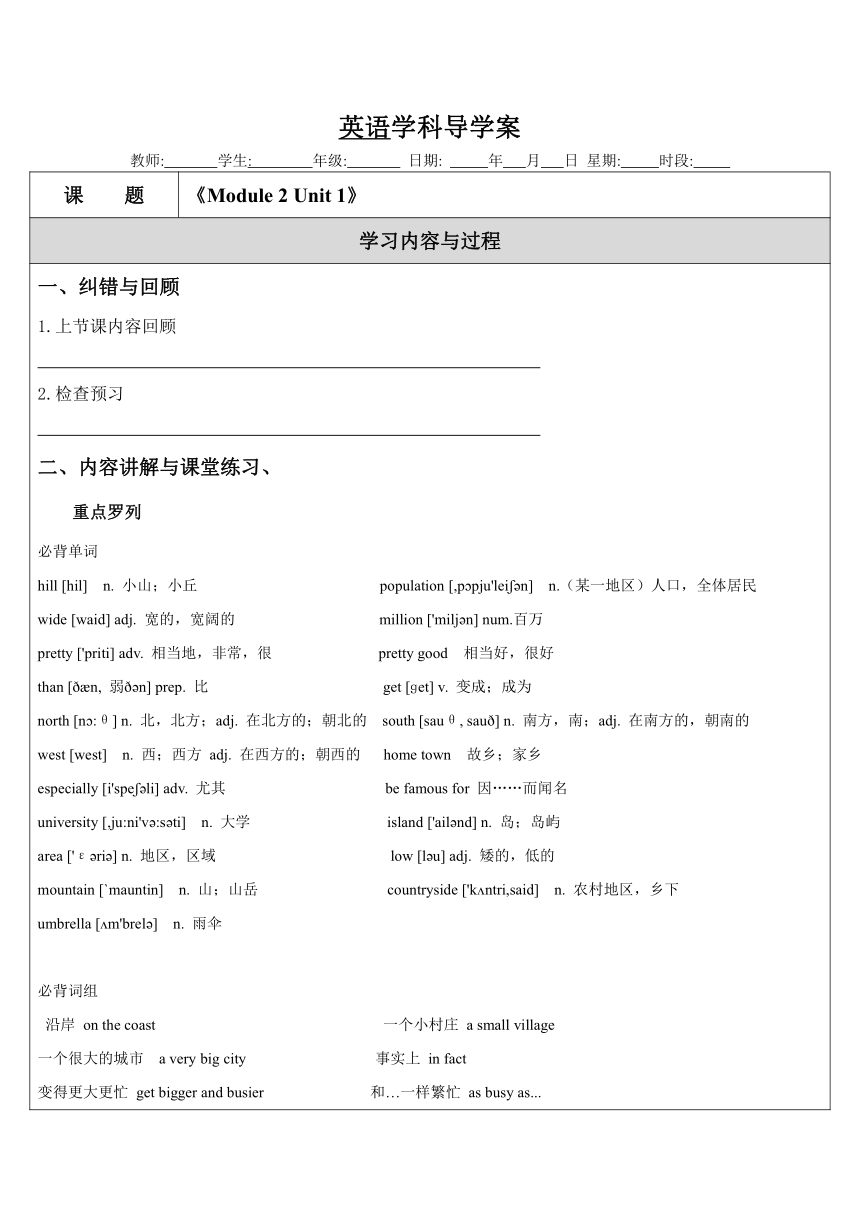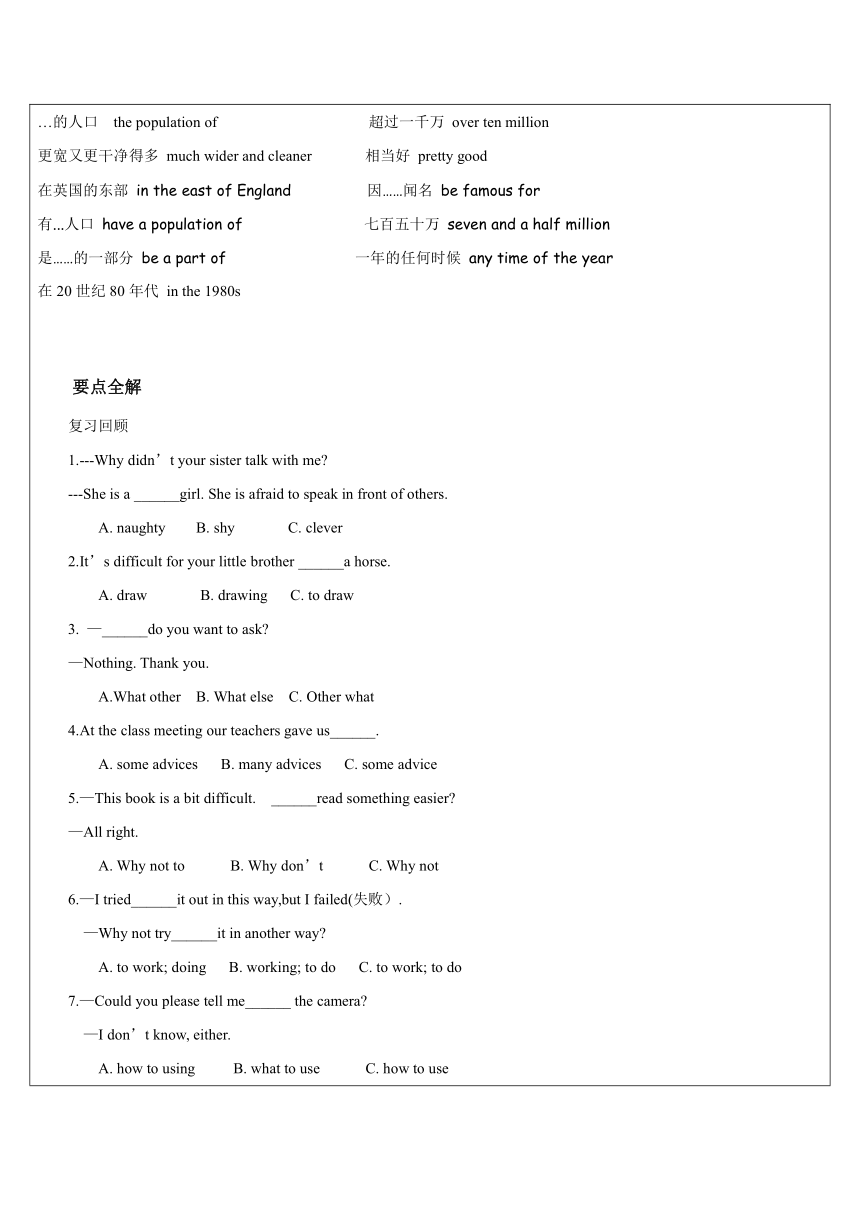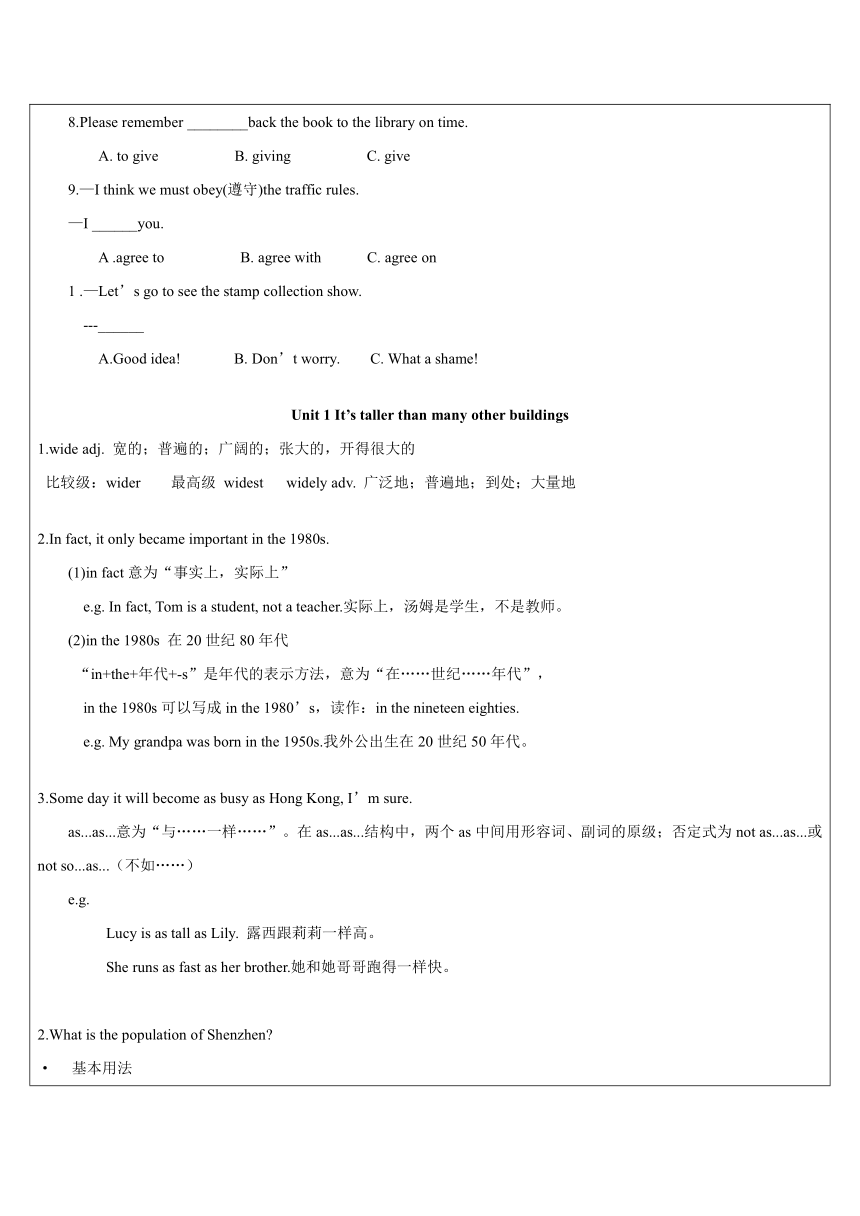Module 2 Unit 1 It's taller than many other buildings.导学案(无答案)
文档属性
| 名称 | Module 2 Unit 1 It's taller than many other buildings.导学案(无答案) |

|
|
| 格式 | doc | ||
| 文件大小 | 29.8KB | ||
| 资源类型 | 教案 | ||
| 版本资源 | 外研版 | ||
| 科目 | 英语 | ||
| 更新时间 | 2021-08-26 10:28:20 | ||
图片预览



文档简介
英语学科导学案
教师:
学生:
年级:
日期:
年
月
日
星期:
时段:
课
题
《Module
2
Unit
1》
学习内容与过程
一、纠错与回顾
1.上节课内容回顾
检查预习
内容讲解与课堂练习、
重点罗列
必背单词
hill
[hil]
n.
小山;小丘
population
[,p?pju'lei??n]
n.(某一地区)人口,全体居民
wide
[waid]
adj.
宽的,宽阔的
million
['milj?n]
num.百万
pretty
['priti]
adv.
相当地,非常,很
pretty
good
相当好,很好
than
[??n,
弱??n]
prep.
比
get
[ɡet]
v.
变成;成为
north
[n?:θ]
n.
北,北方;adj.
在北方的;朝北的
south
[sauθ,
sau?]
n.
南方,南;adj.
在南方的,朝南的
west
[west]
n.
西;西方
adj.
在西方的;朝西的
home
town
故乡;家乡
especially
[i'spe??li]
adv.
尤其
be
famous
for
因……而闻名
university
[,ju:ni'v?:s?ti]
n.
大学
island
['ail?nd]
n.
岛;岛屿
area
['ε?ri?]
n.
地区,区域
low
[l?u]
adj.
矮的,低的
mountain
[`mauntin]
n.
山;山岳
countryside
['k?ntri,said]
n.
农村地区,乡下
umbrella
[?m'brel?]
n.
雨伞
必背词组
沿岸
on
the
coast
一个小村庄
a
small
village
一个很大的城市
a
very
big
city
事实上
in
fact
变得更大更忙
get
bigger
and
busier
和…一样繁忙
as
busy
as...
…的人口
the
population
of
超过一千万
over
ten
million
更宽又更干净得多
much
wider
and
cleaner
相当好
pretty
good
在英国的东部
in
the
east
of
England
因……闻名
be
famous
for
有...人口
have
a
population
of
七百五十万
seven
and
a
half
million
是……的一部分
be
a
part
of
一年的任何时候
any
time
of
the
year
在20世纪80年代
in
the
1980s
要点全解
复习回顾
1.---Why
didn’t
your
sister
talk
with
me?
---She
is
a
______girl.
She
is
afraid
to
speak
in
front
of
others.
A.
naughty
B.
shy
C.
clever
2.It’s
difficult
for
your
little
brother
______a
horse.
A.
draw
B.
drawing
C.
to
draw
3.
—______do
you
want
to
ask?
—Nothing.
Thank
you.
A.What
other
B.
What
else
C.
Other
what
4.At
the
class
meeting
our
teachers
gave
us______.
A.
some
advices
B.
many
advices
C.
some
advice
5.—This
book
is
a
bit
difficult.
______read
something
easier?
—All
right.
A.
Why
not
to
B.
Why
don’t
C.
Why
not
6.—I
tried______it
out
in
this
way,but
I
failed(失败).
—Why
not
try______it
in
another
way?
A.
to
work;
doing
B.
working;
to
do
C.
to
work;
to
do
7.—Could
you
please
tell
me______
the
camera?
—I
don’t
know,
either.
A.
how
to
using
B.
what
to
use
C.
how
to
use
8.Please
remember
________back
the
book
to
the
library
on
time.
A.
to
give
B.
giving
C.
give
9.—I
think
we
must
obey(遵守)the
traffic
rules.
—I
______you.
A
.agree
to
B.
agree
with
C.
agree
on
1
.—Let’s
go
to
see
the
stamp
collection
show.
---______
A.Good
idea!
B.
Don’t
worry.
C.
What
a
shame!
Unit
1
It’s
taller
than
many
other
buildings
1.wide
adj.
宽的;普遍的;广阔的;张大的,开得很大的
比较级:wider
最高级
widest
widely
adv.
广泛地;普遍地;到处;大量地
2.In
fact,
it
only
became
important
in
the
1980s.
(1)in
fact意为“事实上,实际上”
e.g.
In
fact,
Tom
is
a
student,
not
a
teacher.实际上,汤姆是学生,不是教师。
(2)in
the
1980s
在20世纪80年代
“in+the+年代+-s”是年代的表示方法,意为“在……世纪……年代”,
in
the
1980s可以写成in
the
1980’s,读作:in
the
nineteen
eighties.
e.g.
My
grandpa
was
born
in
the
1950s.我外公出生在20世纪50年代。
3.Some
day
it
will
become
as
busy
as
Hong
Kong,
I’m
sure.
as...as...意为“与……一样……”。在as...as...结构中,两个as中间用形容词、副词的原级;否定式为not
as...as...或not
so...as...(不如……)
e.g.
Lucy
is
as
tall
as
Lily.
露西跟莉莉一样高。
She
runs
as
fast
as
her
brother.她和她哥哥跑得一样快。
2.What
is
the
population
of
Shenzhen?
·??基本用法
Population
集体名词,意为“(某一地区的)人口,全体居民”。使用population时应注意以下几点:
(1)
形容人口多或少时,用large,big或small,不能用many,
few,
much或little。
如:The
population
of
China
is
very
large.
中国的人口很多。
表示“某地有多少人口”时的表达方式为:The
population
of+某地+is\was+数。该句型中的population前用定冠词the。
如:The
population
of
Australia
is
more
than
twenty
million.
澳大利亚有2000多万人口。
询问“某地有多少人口”时要用句型“What’s
the
population
of...”或“How
large
is
the
population
of
...?”而不用how
many或how
much等。
如:What’s
the
population
of
Nanning?
=How
large
is
the
population
of
Nanning?
南宁的人口有多少?
population与分数或百分数连用作主语时,谓语动词通常用复数形式。
如:More
than
60
percent
of
the
population
of
that
city
are
workers.
那个城市百分之六十以上的人口是工人。
e.g.
—
is
the
population
of
your
city?
—
About
two
million.
How
B.
What
C.
How
many
D.
How
much
3.It
is
over
ten
million.
Million
数词,意为“百万”。与hundred,thousand
一样,million
与基数词连用时表示确切的数量,必须用单数形式。make
a
million
发大财。
The
Great
Wall
is
famous,
so
people
come
to
visit
it.
million
B.
million
of
C.
millions
of
e.g.
(1)
Millions
of
people
around
the
world
come
to
the
city
every
year.
(2)
They
have
thirty
million
books.
4.That
is
larger
than
the
population
of
many
other
cities
in
China.
than介词,意为“比”。在含有than
的句子中,形容词或副词要用比较级。
如:This
tree
is
taller
than
that
one.
这棵树比那棵树高。
拓展:
rather
than
不是,而不是
more
than
多于
less
than
不到
e.g.
Lin
Fang
comes
home
than
before
this
term.
She
doesn’t
have
so
many
classes
in
the
afternoon.
early
B.
earlier
C.
late
D.
later
拓展:
“比较级+than+any
other+单数可数名词+in...”用于在同一范围内的人或物作比较;如果作比较级的人或物不在同一范围,any后不需要加other。
如:The
Changjiang
River
is
longer
than
any
other
river
in
China.
在中国,长江比其他任何一条河流都长。(同一范围内比较)
The
Changjiang
River
is
longer
than
any
river
in
India.
长江比印度的任何一条河流都长。(不同范围内比较较)
5.My
home
town
is
especially
famous
for
its
university.
especially
副词,意为“尤其”,修饰形容词、副词或动词等。
拓展:specially,
especially
specially:
着重为做某事而"专门地、特意地",相当于on
purpose。
especially:
常用来对前面所述的事情进行进一步的说明或补充。
例子:He
likes
all
subjects,
especially
English.他喜欢所有的科目,尤其是英语。
She
came
here
specially
to
say
sorry
to
you.她特意来这里和你道歉。
如:I
don’t
like
getting
up
early,
especially
in
winter.
我不喜欢早起,尤其是在冬天。
(2)be
famous
for
意为“以......而出名”
China
is
famous
for
the
long
history.中国因历史悠久而闻名。
辨析:be
famous
for,
be
famous
as
与be
famous
to
be
famous
for其后一般跟事物,表示“因/由于......而闻名”France
is
famous
for
its
fine
food
and
wine.法国以其精美的事物和葡萄酒而闻名。be
famous
as其后一般跟表示职业或身份的词,表示“作为......而出名”Mo
Yan
is
famous
as
a
great
writer.莫言作为一名伟大的作家而出名。be
famous
to其后一般跟人,表示“对......是熟悉的,为......所熟知”Yao
Ming
is
famous
to
most
young
people.姚明为大多数年轻人所熟悉。
6.I
come
from
Cambridge,a
beautiful
city
in
the
east
of
England.
south
n.
南方,南;adj.
在南方的,朝南的
拓展
in
the
north
of
在...的北部
在同一范围内,受管辖的两个地区。
on
the
north
of
在...的北面
接壤,互不管辖的两个地区。
to
the
north
of
在....的北面
不接壤,互不管辖的两个地区。
e.g.
Japan
is
to
the
east
of
China.日本在中国以东。
Liaoning
is
in
the
north
of
China.辽宁在中国的北部。
Russia
is
on
the
north
of
China.俄罗斯在中国的北面。
课堂练习
1.Hubei
is
Hunan.
A.
on
the
north
of
B.
in
the
north
of
C.
to
the
north
of
2.There
are
two
_______people
living
in
the
city.
A.
millions
of
B.
million
C.
millions
3.
---How
much
does
it
cost
to
build
the
second
library?
---Four
_______
yuan.
A.million
of
B.millions
C.million
4.With
the
help
of
the
new
skill,
Liu
Xiang
can
run
______
than
before.
A.
fast
B.
faster
C.fastest
5.Foshan
is
______
than
Shanghai.
A.
small
B.
smaller
C.
Smallest
6.
Shanghai
is
______
the
east
of
China.
A.
to
B.
in
C.
On
7.
Japan
is
______
the
east
of
Asia.
A.
in
B.
on
C.
to
8.
______
there
was
a
traffic
jam,
______
he
didn’t
get
there
on
time.
A.
Because;
so
B.Because;
though
C.Because;/
9.We’ll
have
dinner
at
Qianxilong
Restaurant,
which
is
famous
_______it’s
seafood.
A.
of
B.
as
C.
for
10.About
_____
of
the
students
in
Grade
Nine
this
year
were
born
in
the
_____.
A.
third
fifth;
1997
B.
three
fifths;
1990s
C.
third
fifths;
1990s
11.Jack
doesn’t
work
_______
Tom.
A.
as
better
as
B.
so
good
as
C.
so
hard
as
12.The
population
of
the
world
in
the
20th
century
became
much
______
than
that
in
the
19th.
A.smaller
B.larger
C.more
?
【小结】
课堂总结
学生对本次课所学知识点的总结:
提示:(知识点/规律/定律/语法点/方法等)
学生签字:
教师:
学生:
年级:
日期:
年
月
日
星期:
时段:
课
题
《Module
2
Unit
1》
学习内容与过程
一、纠错与回顾
1.上节课内容回顾
检查预习
内容讲解与课堂练习、
重点罗列
必背单词
hill
[hil]
n.
小山;小丘
population
[,p?pju'lei??n]
n.(某一地区)人口,全体居民
wide
[waid]
adj.
宽的,宽阔的
million
['milj?n]
num.百万
pretty
['priti]
adv.
相当地,非常,很
pretty
good
相当好,很好
than
[??n,
弱??n]
prep.
比
get
[ɡet]
v.
变成;成为
north
[n?:θ]
n.
北,北方;adj.
在北方的;朝北的
south
[sauθ,
sau?]
n.
南方,南;adj.
在南方的,朝南的
west
[west]
n.
西;西方
adj.
在西方的;朝西的
home
town
故乡;家乡
especially
[i'spe??li]
adv.
尤其
be
famous
for
因……而闻名
university
[,ju:ni'v?:s?ti]
n.
大学
island
['ail?nd]
n.
岛;岛屿
area
['ε?ri?]
n.
地区,区域
low
[l?u]
adj.
矮的,低的
mountain
[`mauntin]
n.
山;山岳
countryside
['k?ntri,said]
n.
农村地区,乡下
umbrella
[?m'brel?]
n.
雨伞
必背词组
沿岸
on
the
coast
一个小村庄
a
small
village
一个很大的城市
a
very
big
city
事实上
in
fact
变得更大更忙
get
bigger
and
busier
和…一样繁忙
as
busy
as...
…的人口
the
population
of
超过一千万
over
ten
million
更宽又更干净得多
much
wider
and
cleaner
相当好
pretty
good
在英国的东部
in
the
east
of
England
因……闻名
be
famous
for
有...人口
have
a
population
of
七百五十万
seven
and
a
half
million
是……的一部分
be
a
part
of
一年的任何时候
any
time
of
the
year
在20世纪80年代
in
the
1980s
要点全解
复习回顾
1.---Why
didn’t
your
sister
talk
with
me?
---She
is
a
______girl.
She
is
afraid
to
speak
in
front
of
others.
A.
naughty
B.
shy
C.
clever
2.It’s
difficult
for
your
little
brother
______a
horse.
A.
draw
B.
drawing
C.
to
draw
3.
—______do
you
want
to
ask?
—Nothing.
Thank
you.
A.What
other
B.
What
else
C.
Other
what
4.At
the
class
meeting
our
teachers
gave
us______.
A.
some
advices
B.
many
advices
C.
some
advice
5.—This
book
is
a
bit
difficult.
______read
something
easier?
—All
right.
A.
Why
not
to
B.
Why
don’t
C.
Why
not
6.—I
tried______it
out
in
this
way,but
I
failed(失败).
—Why
not
try______it
in
another
way?
A.
to
work;
doing
B.
working;
to
do
C.
to
work;
to
do
7.—Could
you
please
tell
me______
the
camera?
—I
don’t
know,
either.
A.
how
to
using
B.
what
to
use
C.
how
to
use
8.Please
remember
________back
the
book
to
the
library
on
time.
A.
to
give
B.
giving
C.
give
9.—I
think
we
must
obey(遵守)the
traffic
rules.
—I
______you.
A
.agree
to
B.
agree
with
C.
agree
on
1
.—Let’s
go
to
see
the
stamp
collection
show.
---______
A.Good
idea!
B.
Don’t
worry.
C.
What
a
shame!
Unit
1
It’s
taller
than
many
other
buildings
1.wide
adj.
宽的;普遍的;广阔的;张大的,开得很大的
比较级:wider
最高级
widest
widely
adv.
广泛地;普遍地;到处;大量地
2.In
fact,
it
only
became
important
in
the
1980s.
(1)in
fact意为“事实上,实际上”
e.g.
In
fact,
Tom
is
a
student,
not
a
teacher.实际上,汤姆是学生,不是教师。
(2)in
the
1980s
在20世纪80年代
“in+the+年代+-s”是年代的表示方法,意为“在……世纪……年代”,
in
the
1980s可以写成in
the
1980’s,读作:in
the
nineteen
eighties.
e.g.
My
grandpa
was
born
in
the
1950s.我外公出生在20世纪50年代。
3.Some
day
it
will
become
as
busy
as
Hong
Kong,
I’m
sure.
as...as...意为“与……一样……”。在as...as...结构中,两个as中间用形容词、副词的原级;否定式为not
as...as...或not
so...as...(不如……)
e.g.
Lucy
is
as
tall
as
Lily.
露西跟莉莉一样高。
She
runs
as
fast
as
her
brother.她和她哥哥跑得一样快。
2.What
is
the
population
of
Shenzhen?
·??基本用法
Population
集体名词,意为“(某一地区的)人口,全体居民”。使用population时应注意以下几点:
(1)
形容人口多或少时,用large,big或small,不能用many,
few,
much或little。
如:The
population
of
China
is
very
large.
中国的人口很多。
表示“某地有多少人口”时的表达方式为:The
population
of+某地+is\was+数。该句型中的population前用定冠词the。
如:The
population
of
Australia
is
more
than
twenty
million.
澳大利亚有2000多万人口。
询问“某地有多少人口”时要用句型“What’s
the
population
of...”或“How
large
is
the
population
of
...?”而不用how
many或how
much等。
如:What’s
the
population
of
Nanning?
=How
large
is
the
population
of
Nanning?
南宁的人口有多少?
population与分数或百分数连用作主语时,谓语动词通常用复数形式。
如:More
than
60
percent
of
the
population
of
that
city
are
workers.
那个城市百分之六十以上的人口是工人。
e.g.
—
is
the
population
of
your
city?
—
About
two
million.
How
B.
What
C.
How
many
D.
How
much
3.It
is
over
ten
million.
Million
数词,意为“百万”。与hundred,thousand
一样,million
与基数词连用时表示确切的数量,必须用单数形式。make
a
million
发大财。
The
Great
Wall
is
famous,
so
people
come
to
visit
it.
million
B.
million
of
C.
millions
of
e.g.
(1)
Millions
of
people
around
the
world
come
to
the
city
every
year.
(2)
They
have
thirty
million
books.
4.That
is
larger
than
the
population
of
many
other
cities
in
China.
than介词,意为“比”。在含有than
的句子中,形容词或副词要用比较级。
如:This
tree
is
taller
than
that
one.
这棵树比那棵树高。
拓展:
rather
than
不是,而不是
more
than
多于
less
than
不到
e.g.
Lin
Fang
comes
home
than
before
this
term.
She
doesn’t
have
so
many
classes
in
the
afternoon.
early
B.
earlier
C.
late
D.
later
拓展:
“比较级+than+any
other+单数可数名词+in...”用于在同一范围内的人或物作比较;如果作比较级的人或物不在同一范围,any后不需要加other。
如:The
Changjiang
River
is
longer
than
any
other
river
in
China.
在中国,长江比其他任何一条河流都长。(同一范围内比较)
The
Changjiang
River
is
longer
than
any
river
in
India.
长江比印度的任何一条河流都长。(不同范围内比较较)
5.My
home
town
is
especially
famous
for
its
university.
especially
副词,意为“尤其”,修饰形容词、副词或动词等。
拓展:specially,
especially
specially:
着重为做某事而"专门地、特意地",相当于on
purpose。
especially:
常用来对前面所述的事情进行进一步的说明或补充。
例子:He
likes
all
subjects,
especially
English.他喜欢所有的科目,尤其是英语。
She
came
here
specially
to
say
sorry
to
you.她特意来这里和你道歉。
如:I
don’t
like
getting
up
early,
especially
in
winter.
我不喜欢早起,尤其是在冬天。
(2)be
famous
for
意为“以......而出名”
China
is
famous
for
the
long
history.中国因历史悠久而闻名。
辨析:be
famous
for,
be
famous
as
与be
famous
to
be
famous
for其后一般跟事物,表示“因/由于......而闻名”France
is
famous
for
its
fine
food
and
wine.法国以其精美的事物和葡萄酒而闻名。be
famous
as其后一般跟表示职业或身份的词,表示“作为......而出名”Mo
Yan
is
famous
as
a
great
writer.莫言作为一名伟大的作家而出名。be
famous
to其后一般跟人,表示“对......是熟悉的,为......所熟知”Yao
Ming
is
famous
to
most
young
people.姚明为大多数年轻人所熟悉。
6.I
come
from
Cambridge,a
beautiful
city
in
the
east
of
England.
south
n.
南方,南;adj.
在南方的,朝南的
拓展
in
the
north
of
在...的北部
在同一范围内,受管辖的两个地区。
on
the
north
of
在...的北面
接壤,互不管辖的两个地区。
to
the
north
of
在....的北面
不接壤,互不管辖的两个地区。
e.g.
Japan
is
to
the
east
of
China.日本在中国以东。
Liaoning
is
in
the
north
of
China.辽宁在中国的北部。
Russia
is
on
the
north
of
China.俄罗斯在中国的北面。
课堂练习
1.Hubei
is
Hunan.
A.
on
the
north
of
B.
in
the
north
of
C.
to
the
north
of
2.There
are
two
_______people
living
in
the
city.
A.
millions
of
B.
million
C.
millions
3.
---How
much
does
it
cost
to
build
the
second
library?
---Four
_______
yuan.
A.million
of
B.millions
C.million
4.With
the
help
of
the
new
skill,
Liu
Xiang
can
run
______
than
before.
A.
fast
B.
faster
C.fastest
5.Foshan
is
______
than
Shanghai.
A.
small
B.
smaller
C.
Smallest
6.
Shanghai
is
______
the
east
of
China.
A.
to
B.
in
C.
On
7.
Japan
is
______
the
east
of
Asia.
A.
in
B.
on
C.
to
8.
______
there
was
a
traffic
jam,
______
he
didn’t
get
there
on
time.
A.
Because;
so
B.Because;
though
C.Because;/
9.We’ll
have
dinner
at
Qianxilong
Restaurant,
which
is
famous
_______it’s
seafood.
A.
of
B.
as
C.
for
10.About
_____
of
the
students
in
Grade
Nine
this
year
were
born
in
the
_____.
A.
third
fifth;
1997
B.
three
fifths;
1990s
C.
third
fifths;
1990s
11.Jack
doesn’t
work
_______
Tom.
A.
as
better
as
B.
so
good
as
C.
so
hard
as
12.The
population
of
the
world
in
the
20th
century
became
much
______
than
that
in
the
19th.
A.smaller
B.larger
C.more
?
【小结】
课堂总结
学生对本次课所学知识点的总结:
提示:(知识点/规律/定律/语法点/方法等)
学生签字:
同课章节目录
- Module 1 How to learn English
- Unit 1 Let's try to speak English as much as possi
- Unit 2 You should smile at her.
- Unit 3 Language in use .
- Module 2 My home town and my country
- Unit 1 It's taller than many other buildings.
- Unit 2 Cambridge is a beautiful city in the east o
- Unit 3 Language in use .
- Module 3 Sports.
- Unit 1 Nothing is more exciting than playing tenni
- Unit 2 This year we training more carefully.
- Unit 3 Language in use .
- Module 4 Planes, ships and trains .
- Unit 1 He lives the farthest from school.
- Unit 2 What is the best way to travel.
- Unit 3 Language in use .
- Module 5 Lao She Teahouse.
- Unit 1 I wanted to see the Beijing Opera.
- Unit 2 It descibes the changes in Chinese society.
- Unit 3 Language in use .
- Module 6 Animals in danger.
- Unit 1 It allows people to get closer to them .
- Unit 2 The WWF is working hard to save them all.
- Unit 3 Language in use .
- Revision module A
- Module 7 A famous story
- Unit 1 Alice was sitting with her sister by the ri
- Unit 2 She was thinking about her cat.
- Unit 3 Language in use .
- Module 8 Accidents
- Unit 1 While the car were changing to red, a car s
- Unit 2 I was trying to pick it up when it bite me
- Unit 3 Language in use .
- Module 9 Population
- Unit 1 The population of China is about 1.37 billi
- Unit 2 Arnwick was a city with 200,000 people.
- Unit 3 Language in use .
- Module 10 The weathe
- Unit 1 It might snow.
- Unit 2 The weather is fine all year round.
- Unit 3 Language in use .
- Module 11 Way of life
- Unit 1 In China ,we open a gift later.
- Unit 2 In England, you usually drink tea with milk
- Unit 3 Language in use .
- Module 12 Help
- Unit 1 What should we do before help arrives?
- Unit 2 Stay away from windows and heavy furniture.
- Unit 3 Language in use .
- Revision module B
